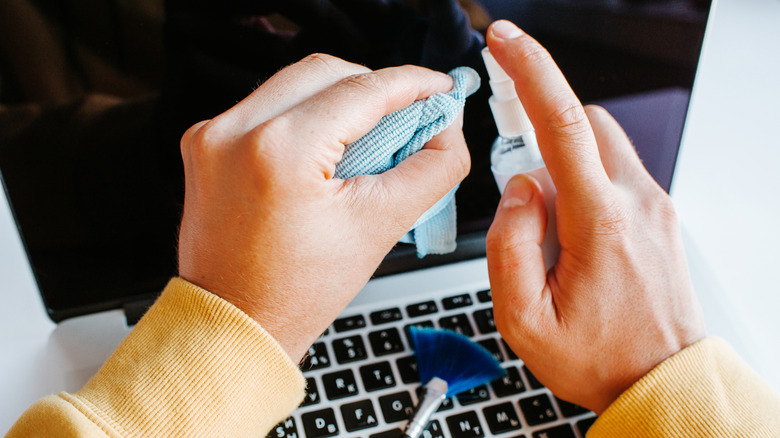Why You Should Think Twice About Using Vinegar To Clean Your Electronics
We may receive a commission on purchases made from links.
Vinegar is a natural household cleaning ingredient that many homeowners use in place of harsher chemicals. The acetic acid found in vinegar works against certain types of bacteria, so it is an effective cleaning agent that people have used for years. You might assume that vinegar can be safely sprayed all around the home, but the cleaning ingredient shouldn't be used on electronic devices in most cases. This is because the acidic chemical can corrode and otherwise damage certain electrical components.
There are quite a few alternative cleaning products that will not damage your expensive devices. You may have found online sources that state vinegar can be used on certain electronics. Yes, there are a few exceptions. This includes using a diluted solution on the outside of closed devices, such as a shut laptop, or applying a small amount of vinegar to remove corrosion from certain camera parts. Although some people choose to use vinegar in these circumstances, it's best to exercise caution when exposing your electronics to this ingredient.
How vinegar damages electronics
Vinegar can destroy electronics in a few different ways. For one, the moisture in vinegar can cause damage. When certain components come into contact with this moisture, they will short circuit. This may either prevent a device from functioning properly or destroy it altogether.
Along with the risk of moisture damage, vinegar is also not safe to use on the inside of electronics due to the risk of corrosion. The acetic acid in vinegar is known to cause the corrosion of certain metals. When looking at mild steel in particular, for example, acetic acid increases the corrosion rate of this material. If certain components of your electronics become corroded, they may fail to function properly. You should ensure that vinegar does not come into contact with any internal parts of your electronics. Keep in mind that the common popular cleaning ingredient can destroy screens as well.
While vinegar should not be used anywhere inside your electronics, it can be used to clean the outside of your laptop if needed. To do this safely, start out by unplugging your laptop. Next, lightly spray a gentle microfiber cloth with a water and vinegar solution. Finally, wipe the outside of the laptop, ensuring that no vinegar comes into contact with any internal components or crevices where it could seep inside. Dry the device with a separate cloth before plugging anything back into it.
Cleaning electronics safely is simple
Although you cannot use vinegar to tackle dirty electronics in most cases, there are quite a few other options to clean your devices safely. You likely bring your phone nearly everywhere with you, so it is important to clean it routinely. To remove grime and dirt from your phone screen, laptop, desktop, or tablet you can use a cleaning wipe specifically formulated for electronics, like the Weiman Disinfecting Electronic Wipes sold by Amazon. These will not damage your screen, unlike vinegar. You can use a toothpick to scrape dirt out of the sides of your device as well. Just make sure that you do not damage any ports or other openings when doing so.
To clean your television screen, simply dampen a microfiber cloth with water and use it to wipe away fingerprints, dust, and any other grime you notice. Don't use Windex or any other glass cleaner on your TV. Keyboards might seem tricky to clean at first glance, but you can remove crumbs and dirt from the cracks and crevices with a can of compressed air. Home Depot's KHD Compressed Air Duster would work well for keyboard cleaning. After cleaning between the keys, you can clean the surface with an electronics wipe.


